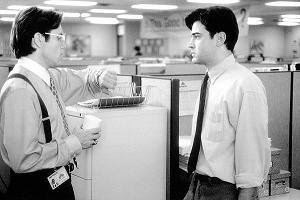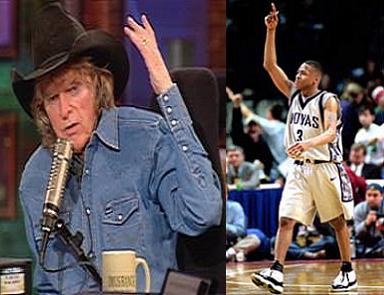There is ongoing tension between the new media and the old--between bloggers and mainstream media ("MSM" in the parlance). That tension is particularly noticeable as to sports media. Bloggers make a living (or at least a nice avocation) by criticizing (often justifiably, in my view) announcers such as
Billy Packer,
Dick Vitale, and
Joe Buck. The old-guard regularly derides the unnamed "bloggers" out there on the Internets, who level criticism at them and at the athletes and coaches, in their view without any knowledge or basis for those criticisms.
That tension came to a head last Thursday when Colin Cowherd of ESPN Radio encouraged his listeners, on the air, to launch a "Denial-of-Service" ("DNS" or "DoS") attack on the sports blog The Big Lead. As Professor Susan Brenner explains, in a DNS attack, users flood a network so as to consume scarce resources or disrupt physical components of the network. The purpose of a DNS attack is to prevent the web-site operator from providing information to those who wish to visit the site for that purpose. Here, users flooded the web site with so many hits that the server became overloaded and the site shut down from Thursday morning until sometime on Saturday. Good summaries
here and here. A good explanation of DNS attacks is
here.
The incident unified most of the major sports blogs and their readers in condemnation of Cowherd and ESPN (a list of, and link to, blog commentary can be found
here and
here -- some of it less than politic.). The general view is that Cowherd crossed an ethical line, both for journalism and for the internet. ESPN's new ombudsman, Le Anne Schreiber,
discussed ESPN's adoption of a (new) "zero-tolerance" policy for personalities using the airwaves to attack businesses in this way. This says nothing about whether ESPN will sanction Cowherd for an act in which he obviously took great delight, as when he gloated about the DNS attack sending bloggers the message "just don't screw with us." Unfortunately, there was no policy against what he did at the time he did it. Deadspin has thoughts on Schreiber's column
here. The Big Lead has its thoughts on the whole thing
here.
Some of the commentary also suggested or wondered whether what Cowherd did was unlawful or whether The Big Lead should pursue legal action against Cowherd and/or ESPN. The Big lead's editors stated they were surprised by how often commenters suggested suing and they are "looking into it."
So it is worht considering whether there is any legal there there. That, of course, is why this site exists. For starters, thanks to my colleagues
Hannibal Travis and
Andre Smith, both of whom know more about the Internet, computer law, and telecommunications law than I do and who provided thoughts, guidance, and initial research suggestions for me.
First, was the DNS attack unlawful?
The conduct, standing alone, may not have been. Cowherd's listeners simply visited the blog (a lawful activity) all at the same time. The question is whether Cowherd's (and his listeners') apparent intent to disrupt the blog's operation (as opposed to reading what was on the blog) renders that conduct criminal or tortious. And if so, what legal rules does it violate?
For purposes of applying general tort law, the question is what a DNS attack most resembles in the real (non-electronic) world. The application of law to the electronic world still (for better or worse) still requires such analogies.
At one end, we might compare this to a boycott or protest of The Big Lead--a large number of people refusing to read or patronize a business, perhaps by picketing or protesting on the sidewalks outside the store and encouraging others to respect the boycott; this have the effect of deterring or preventing others from patronizing the business. Perfectly legal (and
constitutionally protected), although I am not sure the analogy works here.
At the other end, Professor Brenner argues that a DNS attack is vandalism, because it damages the victimized web site’s functionality, impairing its ability to provide the services or information it offers to the public." Functionality, she argues, is an essential and integral element of a site operator's property. It is a "nuance" of web-based property that must be taken into account in understanding property and property rights on-line. It is not enough to have a web site up--a blog must be functional and accessible to those who want to see the information posted. So destroying functionality is equivalent to physical destruction of or interference with physical property or the stuff on display within the physical proper. Obviously tortious.
Somewhere in the middle are other analogies I have been turning over that may or may not be tortious in the real world. Maybe this DNS attack is comparable to an organized effort to buy up every copy of a magazine from every newsstand so no one in the general public can read it. Or maybe it is comparable to gathering an enormous group of people and going into a bookstore (off public property and onto the private property) to stand around and browse but not buy anything, just to so overcrowd the place that no one who does want to browse or buy can do so. Not sure which side of the line these fall on.
One last point on framing the appropriate analogue: Much depends on how the DNS attack was carried out. Was it in fact the lawful act of many Cowherd listeners accessing the site at once? Or was it done by a small number of individuals using computer programs to constantly reload the site (apparently as often as once per second)? If the latter, it begins to look more like so-called "cyber-vandalism" and less like a large number of people lawfully accessing the site.
A potentially applicable internet-specific source of law is a federal law prohibting fraud in connection with computers. The law prohibits "knowingly caus[ing] the transmission of a program, information, code, or command, and as a result of such conduct, intentionally caus[ing] damage without authorization, to a protected computer."
18 U.S.C. s. 1030(a)(5)(A)(i). A protected computer is one "used in interstate or foreign commerce or communication." 18 U.S.C. s. 1030(e)(2)(B). And the statute allows the injured party to sue for damages. 18 U.S.C. s. 1030(g). It seems that this should apply to the circumstances here. There was intentional damage, the computer is in interstate commerce (the blog's server at the time was in Romania), and there seems to have been intent.
Second, assuming the attack on web site is unlawful, what is Cowherd's liability (as opposed to the liability of the individuals who took part in the DNS attack)?
The likely legal theory is that Cowherd incited his listeners to engage in the atatck. Under the First Amendment, speech rises to the level of
unprotected incitement only "where such advocacy is directed to inciting or producing imminent lawless action and is likely to incite or produce such action." This includes inciting others to engage in tortious as well as criminal behavior.
This traditionally is a very high hurdle. The theory of the First Amendment is that we punish those who engage in unlawful conduct, not those who speak about it, especially those who are speaking to an unseen mass audience. Did Cowherd intend for his listeners to do this and is it likely that they would have? The intent part seems present, especially since (according to ombudsman Schreiber's column, Cowher proudly announced that they had crashed the site in 90 seconds, then told them to "knock it out again, just for fun." But how likely was it that people would act on his words? Cowherd might try to argue, for example, that he was just using rhetorical hyperbole and that he did not expect anyone to take him seriously (even if he hoped they would).
The other theory as to Cowherd would be conspiracy to crash this site, but this is much more difficult. Conspiracy requires an
agreement
among the speakers and actors and there was no such agreement between Cowherd and his listeners.
Third, is ESPN potentially in trouble with the Federal Communications Commission?
The FCC can sanction a broadcast licensee where on-air personalities incite listeners to engage in unlawful conduct, since it calls into question the licensee's basical qualifications to hold a license. But in (stated) light of First Amendment concerns, the FCC narrowly interprets and sparingly wields this power. In 2004, the Commission
refused to take enforcement action against several Clear Channel subsidiaries that broadcast hosts and callers urging drivers hit bicyclists or run bicyclists off the road or throw bottles at them as they drove by. The FCC typically declines to undertake enforcement unless a court first determines that some unlawful incitement, as defined in
Brandenburg
, occurred.
So I am not sure where that leaves us--but in this forum, I do not have to decide anything. Depending on what The Big Lead does, this could be a test case of how sports blog and mainstream sports media will interact with one another and with the law.
 Tonight at 7:15 p.m. EST I will be a guest on Celticsstuff Live (update: podcast available here) a radio show devoted to discussion of the Boston Celtics, my favorite NBA team. We will be discussing a recent post that I helped to write on The Situationist entitled "The Situation of the NBA Draft," which examined how NBA players' success is often based on the situation in which they play, even though we tend to judge them as individuals.
Tonight at 7:15 p.m. EST I will be a guest on Celticsstuff Live (update: podcast available here) a radio show devoted to discussion of the Boston Celtics, my favorite NBA team. We will be discussing a recent post that I helped to write on The Situationist entitled "The Situation of the NBA Draft," which examined how NBA players' success is often based on the situation in which they play, even though we tend to judge them as individuals. battery relating to a Chicago restaurant shooting and was facing two to five years in prison, was acquitted last week in a bench trial before an Illinois state judge. Last September, I wrote a lengthy article on Allen's trial entitled "Tony Allen's Trial: Contemplating Guilt." At least from afar, it's interesting that Allen was acquitted since, according to some reports, the Chicago Police Department had the entire shooting on videotape (although I've also read that the videotape actually exonerated Allen--and as we know, establishing reasonable doubt in a criminal trial is a low threshold). In any event, Allen, who is rehabbing from a serious knee injury, still faces a civil lawsuit from Marktwain Johnson, the man whom Allen allegedly directed someone in his group to "F--k him up!"
battery relating to a Chicago restaurant shooting and was facing two to five years in prison, was acquitted last week in a bench trial before an Illinois state judge. Last September, I wrote a lengthy article on Allen's trial entitled "Tony Allen's Trial: Contemplating Guilt." At least from afar, it's interesting that Allen was acquitted since, according to some reports, the Chicago Police Department had the entire shooting on videotape (although I've also read that the videotape actually exonerated Allen--and as we know, establishing reasonable doubt in a criminal trial is a low threshold). In any event, Allen, who is rehabbing from a serious knee injury, still faces a civil lawsuit from Marktwain Johnson, the man whom Allen allegedly directed someone in his group to "F--k him up!"




















